How to Build a Career Development Roadmap & Track Progress
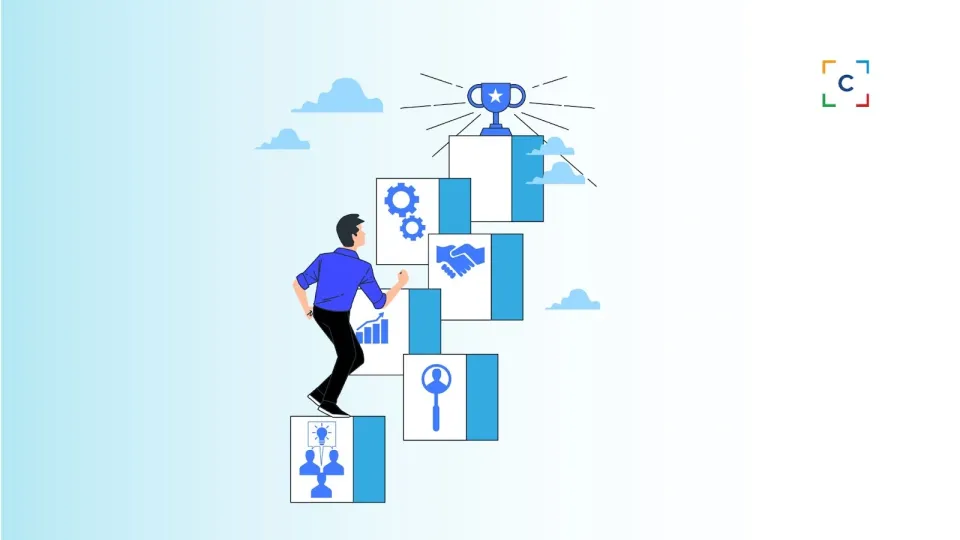
A career roadmap serves as a strategic guide, outlining clear goals and necessary actions to achieve professional aspirations like your dream job. It enhances motivation through visible milestones and ensures continuous skill development to stay competitive.
By regularly tracking progress, individuals can adjust their strategies to navigate a dynamic job market and ensure they remain on track toward their long-term career goals.
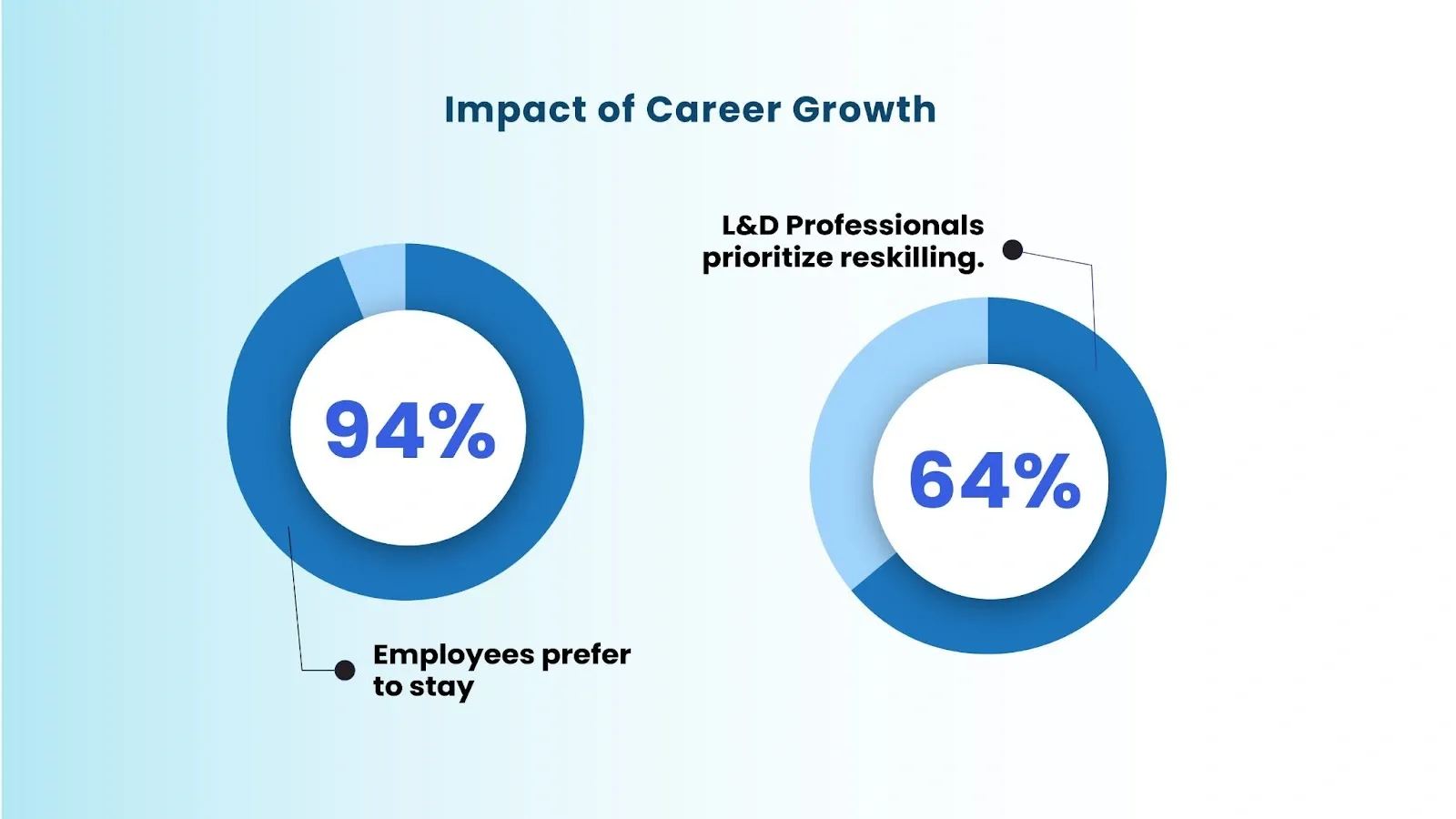
Statistics show that 94% of employees would stay longer at a company that actively fosters their career growth, and 64% of L&D professionals prioritize reskilling. Thus, continuous learning is key to both individual and organizational success. And having a career development roadmap and constant tracking of progress will aid in this success.
In this blog, we will learn the importance of career development and how to create a plan for career growth.
Understanding Career Development
Career development is like a tailored plan that helps you grow professionally. It's all about figuring out what you want from your career, picking up new skills, and grabbing opportunities that match your dreams and abilities. This ongoing journey is key for anyone eager to plan for career growth and find long-term happiness and success in their work. It's your personal path to making your work life as fulfilling as possible!
Significance of Career Development in Professional Growth.
The significance of career development in professional growth can be outlined through several key points:
- Direction and Purpose: Career development helps individuals set clear career objectives, creating a sense of direction and purpose. This clarity enables professionals to focus their efforts on specific goals, making it easier to achieve desired outcomes.
- Skill Enhancement: Through career development, individuals are encouraged to identify and acquire new skills and competencies. This ongoing learning is crucial for adapting to changing industry demands and technologies, ensuring professionals remain competitive and relevant.
- Opportunity Identification: Career development involves exploring and seizing new opportunities within and outside one's current organization. This could include promotions, new projects, or different roles that align with long-term career goals.
- Increased Job Satisfaction: With a plan for career growth, professionals are more likely to pursue roles and projects that align with their interests and strengths. This alignment naturally leads to higher job satisfaction as individuals engage in work that is meaningful to them.
Common challenges professionals face without a Career development plan
- Lack of Direction: Without a structured plan for career growth, it’s easy to feel lost and uncertain about the next steps. This can lead to a sense of stagnation, as it becomes challenging to figure out which opportunities to chase and which skills to develop.
- Missed Opportunities: Without a plan, you might not be ready when the right opportunities come knocking. Being unprepared can mean missing out on exciting roles or projects that could have been a perfect fit for your career ambitions.
- Inefficient Skill Development: Diving into skill development without a clear plan can lead to learning skills that don't align with your career goals or the current job market. This mismatch can limit your effectiveness and reduce your chances of landing your dream job.
- Decreased Competitiveness: In industries that evolve quickly, staying competitive is key. Without actively planning your career development, you might lag behind peers who are enhancing their skills and knowledge, making it harder to stand out to employers.
- Low Job Satisfaction: It’s tough to feel connected to your work when you're not sure how it fits into your long-term career goals. This disconnect can lead to lower job satisfaction as your daily tasks may seem less meaningful.
Creating a clear and adaptable plan for career growth can address these challenges. This plan serves as a roadmap to help you acquire the right skills, pursue suitable opportunities, and align your career moves with your overall life goals, making your professional journey both enjoyable and successful.
Career Development Roadmap
A career development roadmap is your personal guide to professional success. Think of it as your strategic plan that lays out all the steps you'll need to hit your professional goals and climb the career ladder. It’s designed to help you navigate the twists and turns of career progression, making sure every step you take moves you closer to your long-term dreams. This roadmap is super important for anyone serious about crafting an effective plan for career growth.
Here’s how a career development roadmap functions:
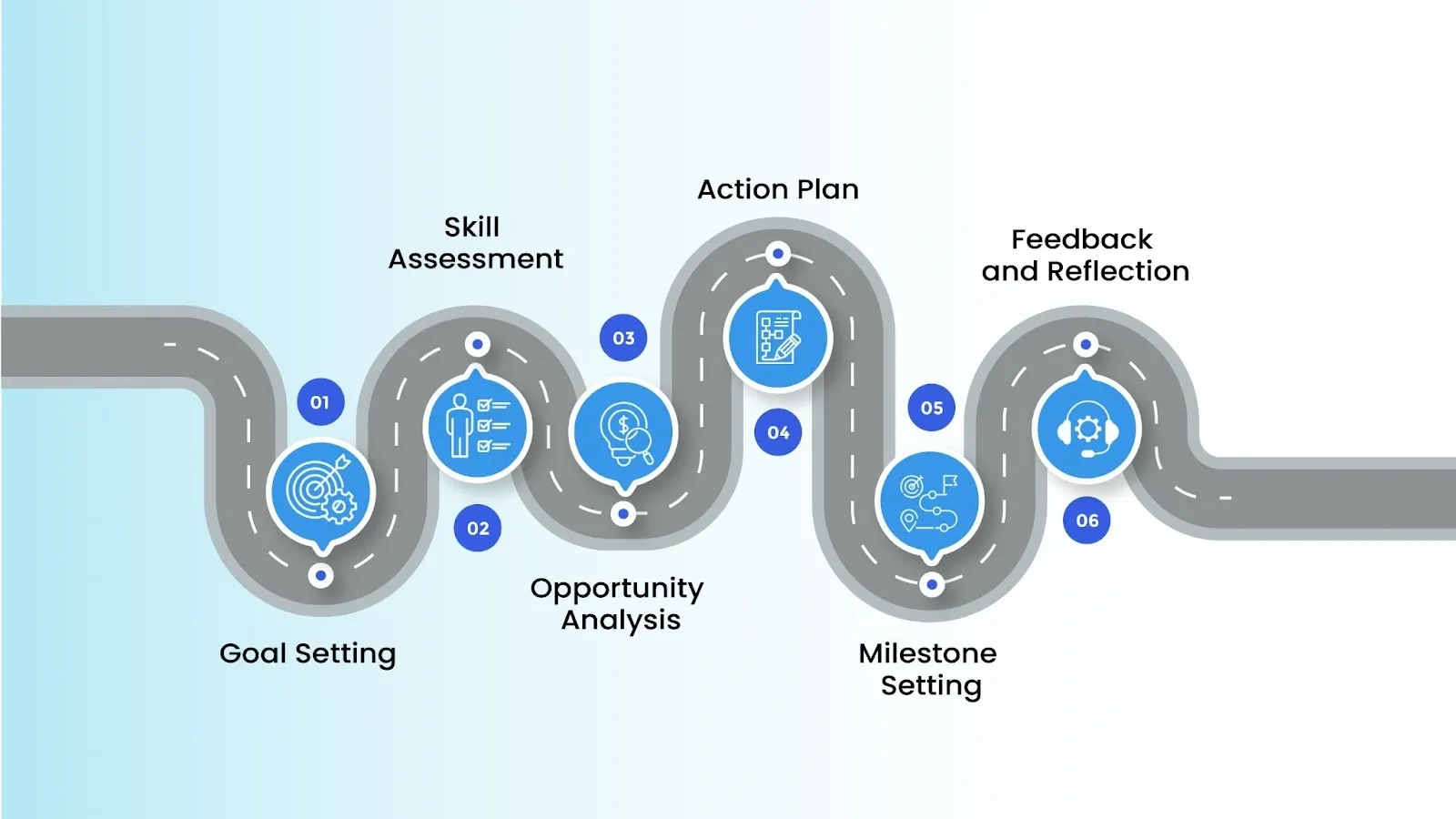
- Goal Setting: The first step is defining clear, achievable career goals. These could be short-term objectives, like learning a new skill or earning a certification, or long-term ambitions, such as achieving a senior managerial position or becoming an expert in a particular field.
- Skill Assessment: Evaluating current skills and identifying gaps is crucial. This assessment helps you understand what skills need to be developed or enhanced to move closer to your career goals.
- Opportunity Analysis: This involves researching potential career opportunities within your field that align with your skills and goals. It helps in identifying what roles are available, what skills they require, and how these opportunities can fit into your long-term career plans.
- Action Plan: The roadmap includes a detailed action plan based on the goals, skills, and opportunities. This plan outlines what steps to take, such as specific training programs, networking events, or projects, and when these should be completed to stay on track with your career progression.
- Milestone Setting: To effectively monitor progress, setting milestones is essential. These serve as checkpoints to assess whether you are on track toward your goals and allow for adjustments to the plan as necessary.
- Feedback and Reflection: Regular feedback, both from self-evaluations and external sources such as mentors or supervisors, is integral to a career development roadmap. It provides insight into your performance and helps refine your approach as you progress.
Introduce getCREDIBLE
getCREDIBLE is an innovative online platform that enhances your professional visibility by letting you build a detailed digital resume showcasing your education, work experiences, and project milestones. It integrates feedback from colleagues directly on your profile, offering valuable social proof that can attract potential employers and collaborators.
Additionally, getCREDIBLE provides tools to set and track career goals, supporting effective career planning and progression. By using getCREDIBLE, professionals can maintain a dynamic profile that not only highlights their achievements but also aids in strategic career development, making it an essential tool for anyone looking to advance their career.
Can getCREDIBLE create a career development plan? This question may pop into your brain. But fret not! You are on the right platform. Let's understand how getCREDIBLE can create a career development plan for you.
Step-by-Step Guide to Creating Your Roadmap on getCREDIBLE
- Self Assessment: the first thing you need to do is identify and understand your interests and passions. Before you start drawing your roadmap, you should know what you want to achieve in your career. It can be a dream job or anything. So assess yourself. There are a few things that you should keep in mind while evaluating yourself. They are:
- Career goals and aspirations: what you want to become or achieve
- Existing skills or skills you require to develop for achieving your goals
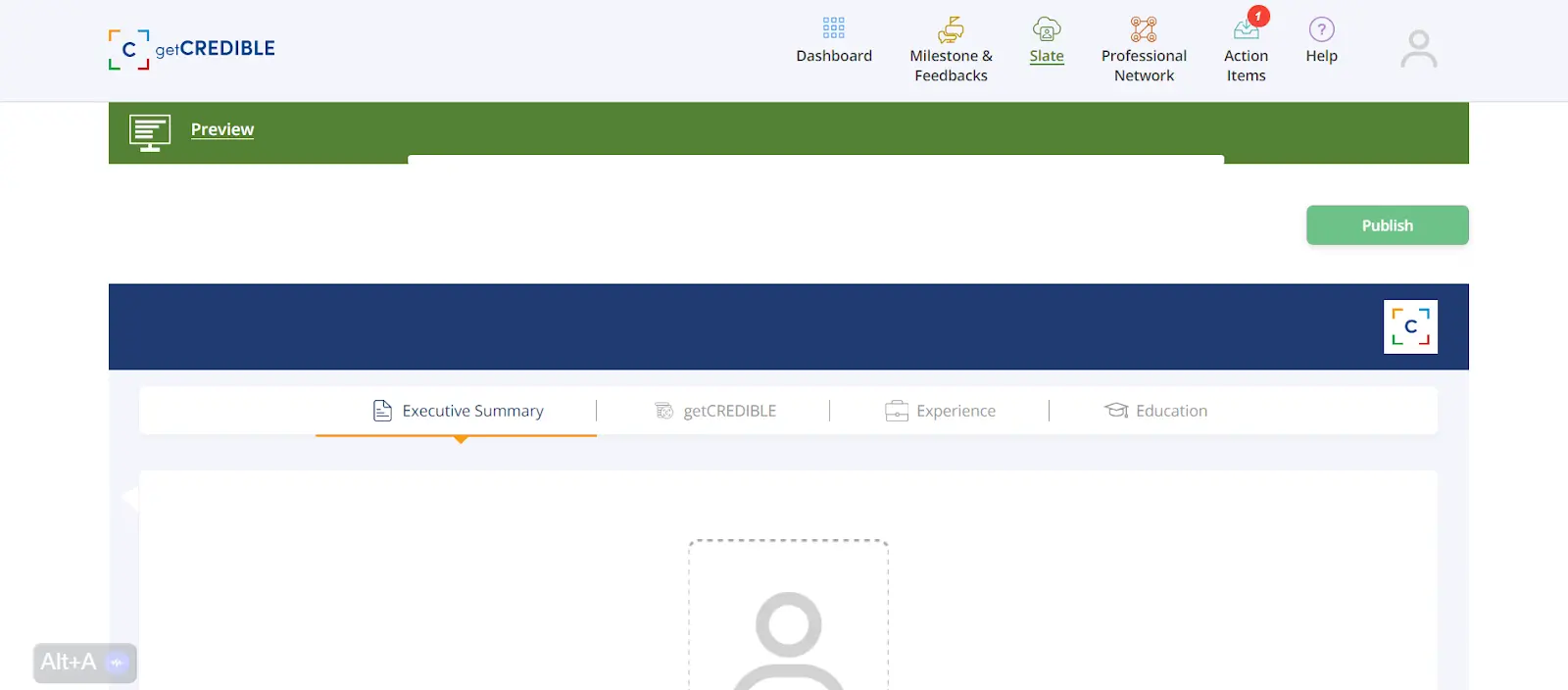
You can add these skills to your digital profile, Slate, and let potential employers know about your expertise.
- Setting clear objectives: Based on the outcomes of your self-assessment, set your short-term and long-term objectives to achieve your career aspirations. These short-term and long-term objectives will help you achieve your main goals by breaking them into small goals, making them slightly easier.
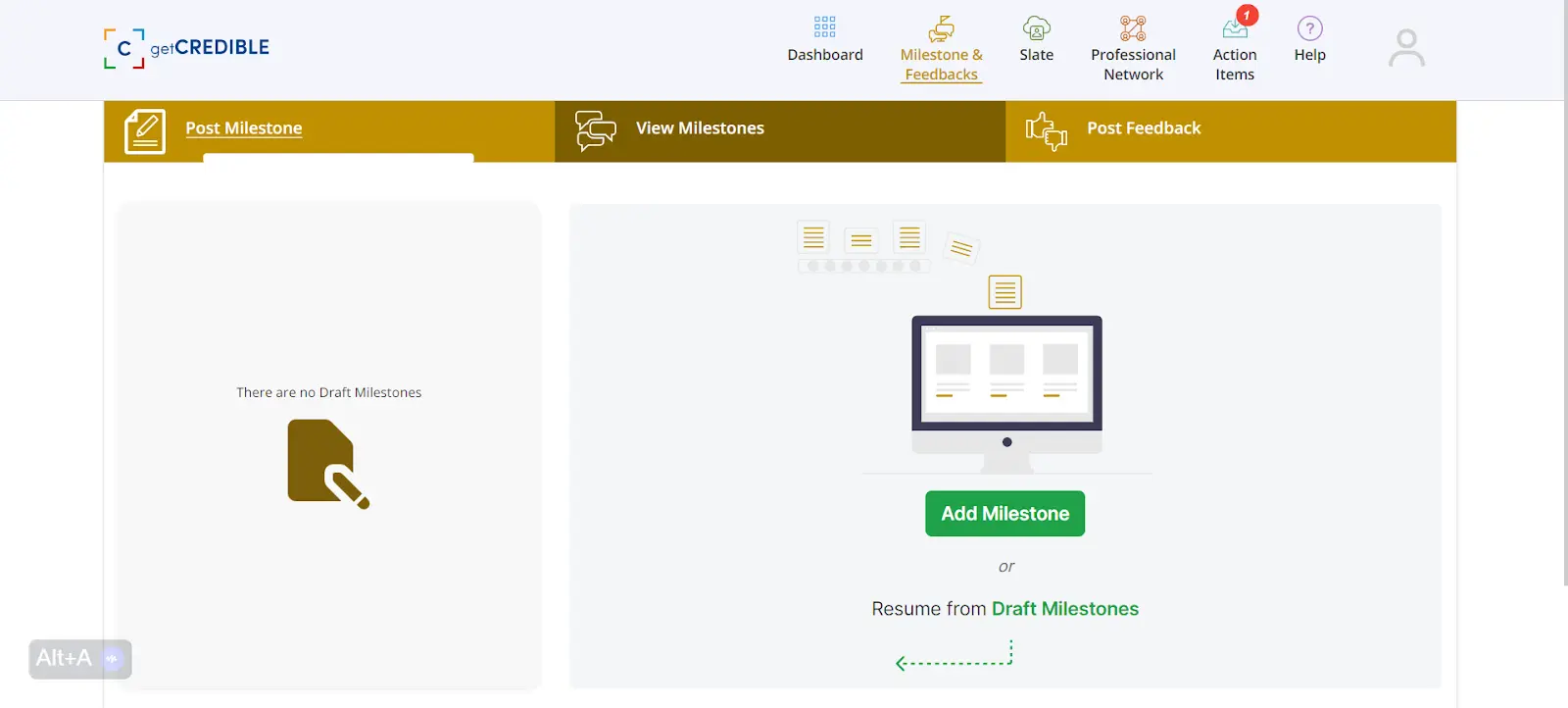
For this, you can post your already achieved goals as milestones in the getCREDIBLE Milestone feature. You can also get feedback from your peers and mentors on milestones to increase your credibility.
- Skill development: Get hands-on experience with the required skills to fulfill your career aspiration and polish your existing skills. Skill development includes both soft skills like conceptual and interpersonal skills and hard skills like tech.
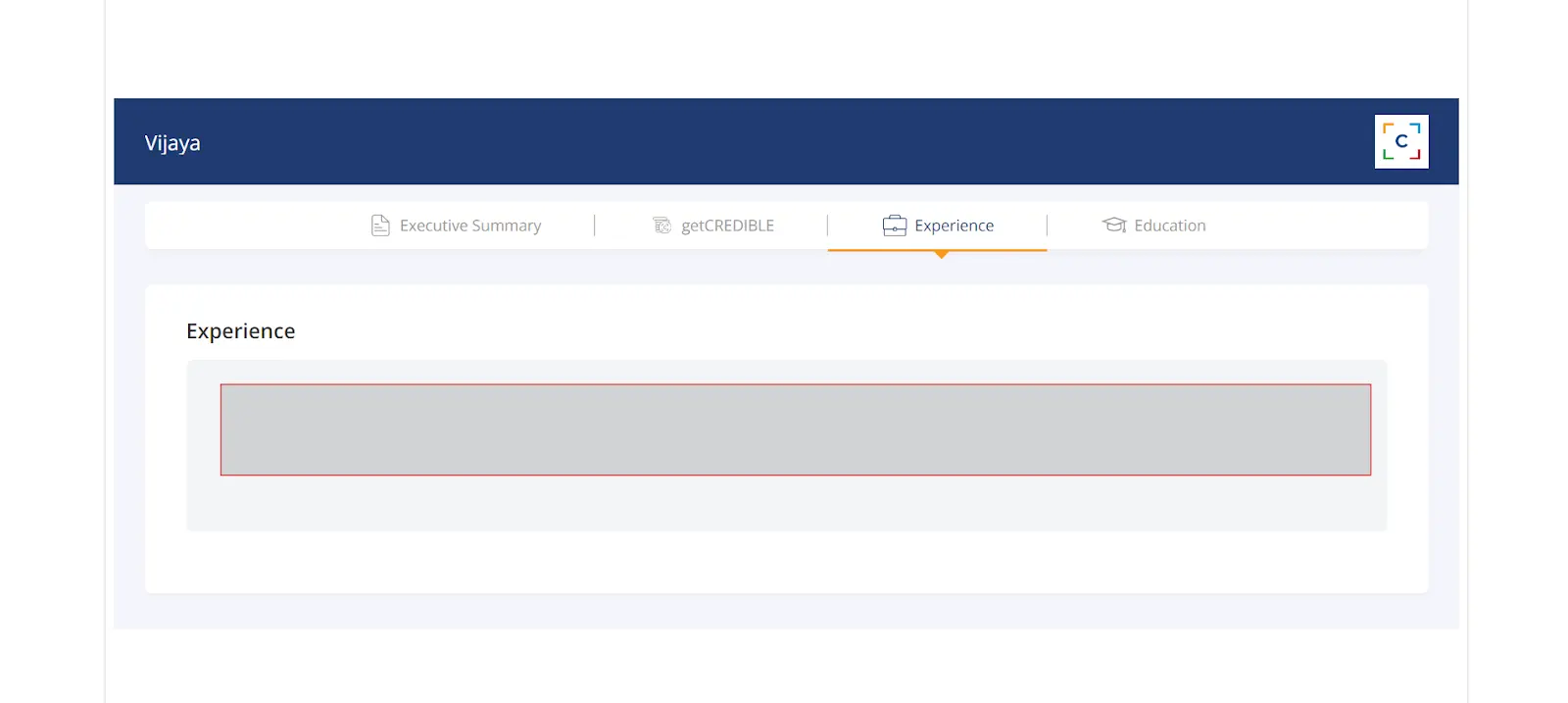
For this, you can showcase your skills and expertise in the experience section of getCREDIBLE to catch your potential recruiter’s attention.
- Networking and Mentorship: Creating connections and professional networking are very beneficial for obtaining better career opportunities. They allow you to understand and analyze the job market.
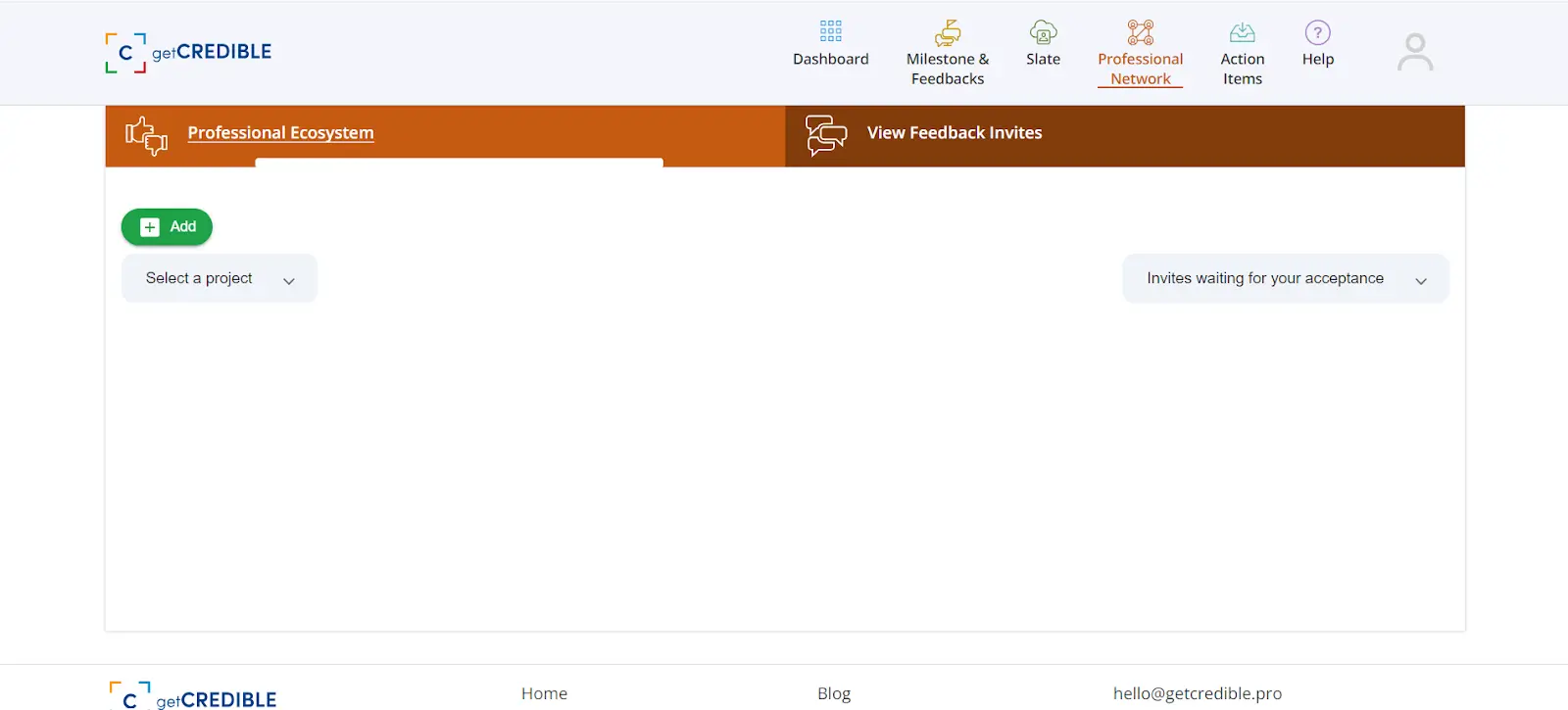
To do this, you can use getCREDIBLE’s Professional Network feature. You can add peers and mentors from your projects and create connections with them on getCREDIBLE.
- Feedback and performance Review: While creating milestones and networking on getCREDBLE, you can also get feedback from your network on milestones and use it to modify or improve your career roadmap. The feedback will act as career advice.
Conclusion
The role of a digital resume in today's career landscape is pivotal. It serves not just as a reflection of your professional image but as a strategic tool in mapping out your career development and tracking your progress. Platforms like getCREDIBLE are instrumental in presenting your skills, achievements, and career aspirations in a format that aligns with employer expectations and career advancement opportunities.
A digital resume on getCREDIBLE helps articulate your career objectives, ensuring they are in sync with the roles you aim for. This clarity is crucial for positioning yourself as the ideal candidate for future opportunities.
To leverage these dynamic features and elevate your career narrative, consider starting your journey with getCREDIBLE today. Register now!
Frequently Asked Questions
- How do you create a career development roadmap?
- To create a career development roadmap, identify your long-term career goals, outline necessary skills and experiences, and set clear, achievable milestones.
- How do you keep track of career progression?
- Keep track of career progression by regularly reviewing goals, documenting achievements, and adjusting the roadmap as needed.
